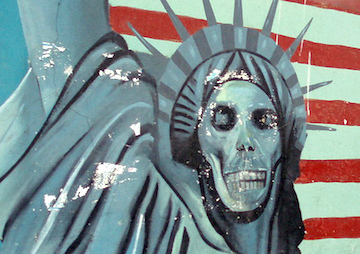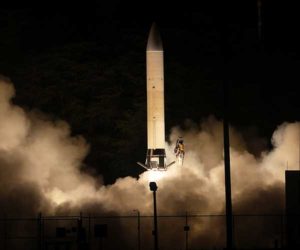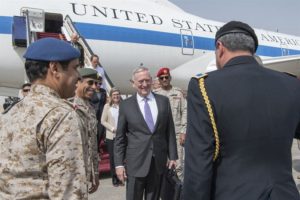For the U.S., There’s No Business Like the Arms Business
Why do major U.S. exports like Hollywood movies and Midwestern grain garner regular media coverage, while trends in weapons exports remain in relative obscurity? A mural near the former U.S. Embassy in Tehran, Iran. (David Holt / CC-BY-2.0)
1
2
3
A mural near the former U.S. Embassy in Tehran, Iran. (David Holt / CC-BY-2.0)
1
2
3
In addition, the Obama administration has gone to great lengths to build a defense relationship with India, a development guaranteed to benefit U.S. arms exporters. Last year, Washington and New Delhi signed a 10-year defense agreement that included pledges of future joint work on aircraft engines and aircraft carrier designs. In these years, the U.S. has made significant inroads into the Indian arms market, which had traditionally been dominated by the Soviet Union and then Russia. Recent deals include a $5.8 billion sale of Boeing C-17 transport aircraft and a $1.4 billion agreement to provide support services related to a planned purchase of Apache attack helicopters.
And don’t forget “volatile” Europe. Great Britain’s recent Brexit vote introduced an uncertainty factor into American arms exports to that country. The United Kingdom has been by far the biggest purchaser of U.S. weapons in Europe of late, with more than $6 billion in deals struck over the past two years alone — more, that is, than the U.S. has sold to all other European countries combined.
The British defense behemoth BAE is Lockheed Martin’s principal foreign partner on the F-35 combat aircraft, which at a projected cost of $1.4 trillion over its lifetime already qualifies as the most expensive weapons program in history. If Brexit-driven austerity were to lead to a delay in, or the cancellation of, the F-35 deal (or any other major weapons shipments), it would be a blow to American arms makers. But count on one thing: were there to be even a hint that this might happen to the F-35, lobbyists for BAE will mobilize to get the deal privileged status, whatever other budget cuts may be in the works.
On the bright side (if you happen to be a weapons maker), any British reductions will certainly be more than offset by opportunities in Eastern and Central Europe, where a new Cold War seems to be gaining traction. Between 2014 and 2015, according to the Stockholm International Peace Research Institute, military spending increased by 13% in the region in response to the Russian intervention in Ukraine. The rise in Poland’s outlays, at 22%, was particularly steep.
Under the circumstances, it should be obvious that trends in the global arms trade are a major news story and should be dealt with as such in the country most responsible for putting more weapons of a more powerful nature into the hands of those living in “volatile” regions. It’s a monster business (in every sense of the word) and certainly has far more dangerous consequences than licensing a Hollywood blockbuster or selling another Boeing airliner.
Historically, there have been rare occasions of public protest against unbridled arms trafficking, as with the backlash against “the merchants of death” after World War I, or the controversy over who armed Saddam Hussein that followed the 1991 Persian Gulf War. Even now, small numbers of congressional representatives, including John Conyers, Chris Murphy, and Kentucky Senator Rand Paul, continue to try to halt the sale of cluster munitions, bombs, and missiles to Saudi Arabia.
There is, however, unlikely to be a genuine public debate about the value of the arms business and Washington’s place in it if it isn’t even considered a subject worthy of more than an occasional media story. In the meantime, the United States continues to hold onto the number one role in the global arms trade, the White House does its part, the Pentagon greases the wheels, and the dollars roll in to profit-hungry U.S. weapons contractors.
William D. Hartung, a TomDispatch regular, is the director of the Arms and Security Project at the Center for International Policy and a senior advisor to the Security Assistance Monitor. He is the author of Prophets of War: Lockheed Martin and the Making of the Military-Industrial Complex.
Follow TomDispatch on Twitter and join us on Facebook. Check out the newest Dispatch Book, Nick Turse’s Next Time They’ll Come to Count the Dead, and Tom Engelhardt’s latest book, Shadow Government: Surveillance, Secret Wars, and a Global Security State in a Single-Superpower World.
Copyright 2016 William D. Hartung Your support matters…Independent journalism is under threat and overshadowed by heavily funded mainstream media.
You can help level the playing field. Become a member.
Your tax-deductible contribution keeps us digging beneath the headlines to give you thought-provoking, investigative reporting and analysis that unearths what's really happening- without compromise.
Give today to support our courageous, independent journalists.




You need to be a supporter to comment.
There are currently no responses to this article.
Be the first to respond.